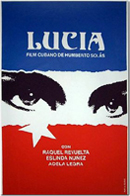Wednesday, November 10
Lucía (Directed by Humberto Solas)
LUCIA / The following film notes were prepared for the New York State Writers Institute by Kevin Jack Hagopian, Senior Lecturer in Media Studies at Pennsylvania State University:
Told in three segments, set in 1895, 1932, and in the heady years just after the Revolution, Lucia is an epic of Cuban history. The three Lucias are literally, different women, each of their stories combining into a larger narrative of slow, painful progress for
As Lucia abundantly shows, the Cuban revolutionary cinema is a profoundly analytical form; accustomed to the demonizing of all Cuban cultural products as "propaganda, American audiences are frequently surprised at how critical of revolutionary hypocrisy the great Cuban films of the 1960's are, and how subtly they interrogate the nexus of personal and political engagement. Deeply influenced by the methods and the goals of documentary cinema, Lucia and other `60's Cuban films recruit documentary techniques to reduce the space between "the cinema" and the lived experiences of its Cuban audiences. In the third section of Lucia, the documentary mode becomes dominant, insisting on the material and physical truthfulness of the revolutionary understanding of class struggle.
Friday, November 12
Fresa y Chocolate "Strawberry and Chocolate"
(Directed by Tomás Gutiérrez Alea )

The film revolves around the relationship between a stereotypically devout revolutionary student David Alvarez and an equally stereoptyped homosexual Diego who works in a cultural office in
Amigos del Cine Latinoamericano extends a very cordial invitation to
Fall 2010 Film Series
Cuban Eyes/ Cubanize:
Fifty Years of Cuban Cinema since the Cuban Revolution
FREE AND OPEN TO THE PUBLIC
Most films will be presented on Wednesdays or Thursdays at 6:30 p.m. at the Frick Fine Arts Auditorium
As usual, we will give a short introduction of the film and after the presentation you are welcome to stay for a discussion.
Some films are adult in nature and may not be appropriate for young audiences.

No hay comentarios.:
Publicar un comentario